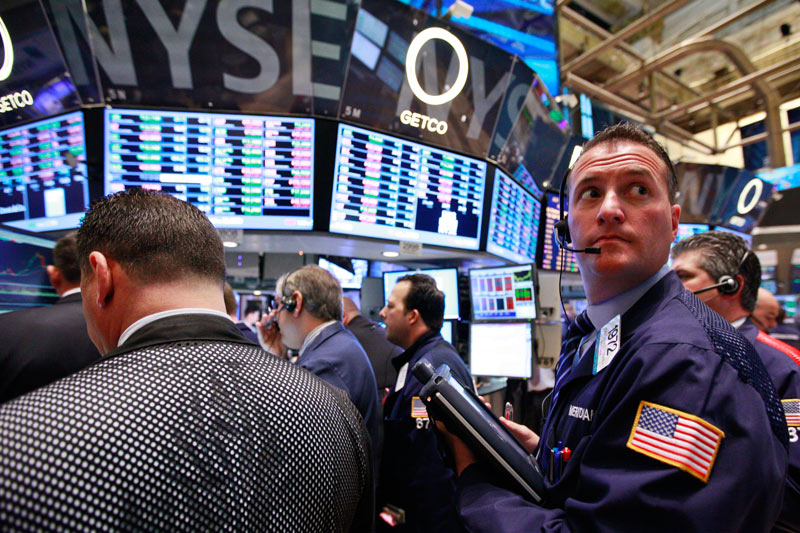SoFi CEO enters prepaid forward contract on 1.5 million shares
Investing.com-- The S&P 500 gave up gains Friday after the Financial Times reported that President Donald Trump is considering imposing a levy of at least 15% to 20% on goods imported from the European Union.
At 2:10 p.m. ET (18:10 GMT), the Dow Jones Industrial Average fell 202 points, or 0.5%, the S&P 500 index fell 0.1%, and the NASDAQ Composite fell 0.1%.
Trade war fears heat up as Trump eyes 15-20% tariffs on EU
The 15-20% levy that the president is considering to impose on EU imports even if a deal is reached would be above the 10% rate that the EU is hoping for, suggesting that negotiations may have stalled.
With the Aug. 1 tariff deadline looming, Trump appears to be turning up the heat on EU to force the block into making deeper concessions.
Earnings deluge continues
Investors are digesting more quarterly results Friday, in what has so far been widely received as a positive start to the new quarterly earnings season.
American Express (NYSE:AXP) stock rose stock rose after the credit card behemoth exceeded estimates for second-quarter profit, fueled by resilient spending by its affluent cardholders.
3M Company (NYSE:MMM) stock gained after the industrial giant raised its full-year profit forecast, as cost-cutting measures and efforts to focus on high-margin products are paying off.
Charles Schwab (NYSE:SCHW) stock rose after the financial services giant reported strong second-quarter earnings, driven by strong client asset growth and improved interest margins.
Also in the spotlight will be Netflix (NASDAQ:NFLX), after the streaming giant reported solid quarterly earnings and hiked its annual revenue guidance after the close Thursday.
That said, Netflix stock slipped after the results failed to live up to heightened analyst expectations.
Netflix’s stock price has surged by more than 43% so far this year, underpinned by hopes that the firm will continue to strengthen its position as one of the most dominant players in the streaming sector.
There is also set to be a barrage of major earnings next week, including prints from Coca-Cola (NYSE:KO), Texas Instruments (NASDAQ:TXN), Alphabet (NASDAQ:GOOGL) and Tesla (NASDAQ:TSLA).
Michigan sentiment index due
On the economic calendar, investors will likely be focusing on the University of Michigan’s guide of consumer sentiment, which is expected to have inched up in July, with inflation expectations holding roughly steady.
Friday’s release will come after separate reports this week painted a picture of an American economy that seems to be on solid footing, at least for the moment.
On Thursday, retail sales figures were stronger than anticipated and weekly jobless claims came in below forecasts. Inflation also stayed just about in line with expectations in June, although tariffs seem to be pushing the prices of some goods higher.
Against this backdrop, the Federal Reserve has largely adopted a "wait-and-see" attitude to future interest rate decisions.
However, Fed Governor Christopher Waller said on Thursday that a rate cut as soon as the central bank’s next meeting this month is justified, citing rising risks to the economy.
He added that the tariff-induced uptick in inflation will likely not be a persistent feature of the economy, but rather a more temporary bump.
The comments come as Fed Chair Jerome Powell has faced intensifying pressure from Trump to quickly slash borrowing costs to help bolster the economy.
Crude gains on Russia sanctions agreement
Oil prices rose Friday on supply concerns fueled by drone attacks on Iraqi oil fields, as well as the European Union reaching an agreement on a new sanctions package against Russia.
At 09:32 ET, Brent futures climbed 1% to $70.22 a barrel, and U.S. West Texas Intermediate crude futures rose 1.2% to $68.36 a barrel.
Four days of drone attacks on oilfields in Iraqi Kurdistan that shut down half the region’s output have supported prices.
Additionally, EU policymakers on Friday signaled the Russian oil price threshold would be lowered as part of a newly agreed sanctions package, a move aimed at limiting Russia’s oil revenues while retaining the country’s supplies in the market to avoid a major shortage.
Ambar Warrick contributed to this article
